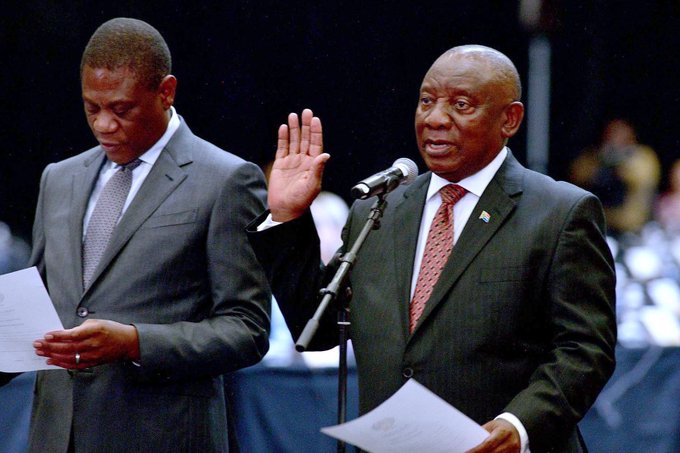South Africa’s Cyril Ramaphosa has been sworn in for a second full term as president, despite his African National Congress (ANC) failing to secure a majority in parliament in last month’s election.
Lawmakers re-elected Ramaphosa last week after the ANC, its long-time rival the Democratic Alliance (DA), and other parties reached a coalition agreement.
For the first time since the end of apartheid in 1994, the ANC lost its majority following the May 29 election, which resulted in no outright winner.
The swearing-in ceremony is attended by many dignitaries, including several African heads of state.
“I swear I will be faithful to the Republic of South Africa… I will obey, observe and uphold the constitution and all other laws of the republic,” Mr Ramaphosa said.
The oath of office was administered by Chief Justice Raymond Zondo.
After Ramaphosa took the oath, a band played the national anthem, followed by a 21-gun salute and a flyover by army helicopters before he delivered his inaugural address.
The uMkhonto weSizwe (MK) party, formed six months ago by former President Jacob Zuma, announced its officials would not participate in the “farcical” inauguration.
The MK party, which garnered 15% of the votes and secured 58 parliamentary seats, also boycotted parliament’s first session last Friday.
Despite the ANC’s vote share dropping by 17 percentage points and losing 70 seats in parliament, Ramaphosa retained the presidency through a power-sharing deal with the pro-business Democratic Alliance (DA) and other parties.
The ANC received 40% of the vote, while the DA came second with 22%.
This coalition signifies a shift to the political center, as left-wing and populist breakaway parties from the ANC declined to join a national unity government.
Ramaphosa is expected to appoint a cabinet in the coming days, which will include his new coalition partners – the DA and three smaller parties. Together, the coalition controls 68% of the seats in parliament.
The president is also expected to outline an agenda to revive the struggling economy.
Under his leadership, the economy has continued to falter amid power cuts, rising crime, and unemployment.
Ramaphosa first assumed the presidency in 2018 when his predecessor, Zuma, was forced to resign due to corruption allegations, which he denied.



